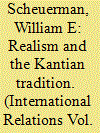|
|
|
Sort Order |
|
|
|
Items / Page
|
|
|
|
|
|
|
| Srl | Item |
| 1 |
ID:
135287


|
|
|
|
|
| Summary/Abstract |
Political cosmopolitanism comes in many different shapes and sizes. Despite its intellectual diversity, cosmopolitanism typically agrees on one crucial matter: any prospective global democracy is best envisioned not in terms of a hierarchical world state, but instead as a multilayered system of global governance resting on an unprecedented dispersion of decision-making authority. In discarding traditional ideas of world government, cosmopolitans typically succumb to a series of mistakes. First, they presuppose unfairly dismissive accounts of world government. Second, they misleadingly contrast their own multilayered and (allegedly) institutionally novel vision to early modern (for example, Hobbesian) ideas of sovereignty, or to Max Weber's influential definition of the modern state. They thus obscure the fact that the modern state's diverse manifestations can only be partly grasped by ideal-types drawn from either Hobbes or Weber. Consequently, they depend on straw person accounts of the modern state. Third, envisioning their proposals as building on the familiar ideal of institutional checks and balances, they misconstrue the contribution that checks and balances can make to global-level democracy. Their hostility to statist ideas about global democracy notwithstanding, their proposals sometimes mimic core attributes of traditional statehood, and they tend inadvertently to ‘bring the state back in’ to global democracy.
|
|
|
|
|
|
|
|
|
|
|
|
|
|
|
|
| 2 |
ID:
098851


|
|
|
|
|
| Publication |
2010.
|
| Summary/Abstract |
Daniel Deudney's impressive reformulation of republican security theory has rightly garnered a great deal of attention from scholars of international politics. However, a close examination of Deudney's theory reveals that it rests on a series of weaknesses. His defense of a novel form of world state depends on a one-sided interpretation of state sovereignty according to which it functions chiefly as a protective device against external foes, an idiosyncratic rereading of modern republican theory and the US framers, and a highly tendentious view of US history. Notwithstanding his noteworthy attempt to break free from the insularity of US political and intellectual life, Deudney reproduces some elements of it.
|
|
|
|
|
|
|
|
|
|
|
|
|
|
|
|
| 3 |
ID:
119272


|
|
|
|
|
| Publication |
2012.
|
| Summary/Abstract |
In contemporary international political theory, 'Cosmopolitanism' is typically juxtaposed to 'Realism', with many varieties of the former building on Kantian moral and political ideals, and the latter presumably rejecting Kant and his aspiration for far-reaching global reform. In agreement with a growing body of scholarship that seeks to challenge conventional views of Realism, this essay attends to the surprisingly complex views of the Kantian legacy (including Hans Kelsen, perhaps the most important neo-Kantian international thinker in the last century) within its ranks. Not all Realists have been unambiguously critical of Kant, and when in fact they have criticized him, they have done so for many different reasons. First-generation Realists (e.g. E. H. Carr, John Herz, Hans Morgenthau, Reinhold Niebuhr, Frederick Schuman and Georg Schwarzenberger) offered an ambivalent reading of Kantianism consistent with their endorsement of the ultimate desirability of major alterations to the global status quo, whereas second-generation Realists (i.e. Henry Kissinger and Kenneth Waltz) tended to read Kant so as to transform him into a forerunner of their own anti-reformist and institutionally conservative versions of Realism. An examination of Realism's rendezvous with Kantianism not only helps draw a more differentiated portrayal of Realism than is still found in much scholarship, but it also helps us understand how Realism dramatically changed within a relatively short space of time during the immediate postwar decades. It also points to some important potential starting points for a more fruitful exchange between Cosmopolitans and Realists.
|
|
|
|
|
|
|
|
|
|
|
|
|
|
|
|
| 4 |
ID:
081202


|
|
|
|
|
| Publication |
2008.
|
| Summary/Abstract |
The commonplace view that the intellectual roots of Hans J. Morgenthau's Realist theory lie in conservative central European political traditions (such as Bismarckian Realpolitik) requires modification. The young Morgenthau was a protégé of one of Weimar Germany's most prominent left-wing legal thinkers and barristers, Hugo Sinzheimer, a committed Social Democrat who influenced many young jurists who hoped to pursue a peaceful, legally-based transition to democratic socialism. Although Morgenthau's biographers have acknowledged his close personal ties to Sinzheimer, they have ignored the ways in which his early work was directly influenced by Sinzheimer's left-wing legal sociology. Morgenthau's initial rendition of Realism took the form of a critical-minded sociology of law, inspired by Sinzheimer, which aimed to bring about fundamental reforms to the international system. Only after the demise of the democratic Left did Morgenthau begin to shed his reformist faith in the possibility of legally based global reform. His mature version of Realism can be interpreted as a response to his disillusionment with the politically progressive and socially reformist vision of law championed by the interwar democratic Left
|
|
|
|
|
|
|
|
|
|
|
|
|
|
|
|
|
|
|
|
|